We all need to keep ourselves aware of the many scams that exist in today’s digital world. New threats are constantly bombarding our everyday lives and can have a huge impact on our privacy and peace of mind. One form of identity theft that you should put on your radar if you haven’t already is debt parking. This type of fraud can negatively impact your financial future and is worth examining in detail. Even worse, you may already be a victim without knowing it.
What is Debt Parking?
Simply put, debt parking is when fake debts are placed onto your consumer credit report without your knowledge.
Crooked debt collectors and other scam artists will plant a debt associated with your identity in an illegal attempt to get you to make payments. These bogus debts can sit on your credit report without your knowledge until you apply for a loan or mortgage. Once discovered, the criminals bet on fear and panic forcing you to pay off the debt in order to clear up your credit or secure lending opportunities.
This shady tactic is often successful as victims rush into making a payment once the fake debt is discovered. An unpaid debt on your credit report can not only prevent you from securing loans for a car or house, but that debt delinquency can also prevent you from getting a job. The pressure a victim feels once the parked debt is uncovered creates an opportunity for fraudsters to profit.
How a Fake Debt Get Parked on Your Credit Report
You would think that the major credit reporting agencies would be able to spot these fake debts and prevent them from occurring in the first place. The reality is these agencies don’t yet have enough safeguards in place to prevent most instances of debt parking. This allows debt collectors, payday lenders, and other fringe financial businesses with shady scruples to plant undue debts on a consumer’s credit report without actually informing the individual of it happening.
A recent FTC settlement with a company that was responsible for a large number of debt parking cases highlights just how serious of an issue this is. The lawsuit brought by the FTC against Midwest Recovery Systems shows that this company reported to the credit agencies nearly $100 million in debts that ended up being phony. These debts appeared on innocent victims’ credit reports as medical bills, debts in bankruptcy, and even debts that had already been paid.
That amount of money parked by one fraudulent company shows how serious of an issue this can be, and how much money these criminals are attempting to coerce everyday people into coughing up. Although the defendants in this FTC lawsuit didn’t pocket all of the debts they parked, they still walked away with around $24 million.
Limiting the Risk of Debt Parking
Without safeguards in place to properly scrutinize these undue debts, regular monitoring of your credit report is an essential step towards limiting the risk of debt parking. By checking your reports with the three major agencies often, you can spot any bogus debts quickly and work to get the situation dealt with before you are in a pressured-to-pay sort of situation.
By monitoring your credit reports and keeping an eye out for fake debts, you can work towards restoration before you are in a position of being forced into paying a bogus debt. However, if you do happen to find yourself in this unnerving situation, don’t automatically pay up just to clear your credit. That’s exactly what the fraudsters want you to do and it plays right into the scam. Having identity theft restoration services in place will help to contact necessary parties to work toward restoration. This will save you valuable time and money and will clear up your credit report in a legitimate manner.
Medical debts are a big source of many debt parking situations. There is a lot of consumer confusion with medical and insurance billing and this provides another opportunity for scammers to take advantage. Educating yourself about your insurance coverage and staying tuned in to any and all of your medical billing history can help limit the risk of debt parking as well. This is easier said than done as medical bills can cause confusion even when accurate. But by keeping an eye on your medical bills in a similar manner to your credit report, you can reduce risk and deal with issues as they arise. The more aware you are, the better.
FTC Action Shows Progress
While the current scope of debt parking is still threatening, recent FTC action against a company responsible for ripping off consumers on a grand scale shows progress. This action should demonstrate to other dubious debt collectors that they can no longer get away with unchecked debt parking scams. Companies that knowingly participate in this sort of behavior are now quickly falling under the watchful eye of a federal agency that can get the issue more in check. Hopefully this will lead to fewer instances of widespread debt parking in the future, an obvious benefit to consumers across the country.
Progress does not mean protection, and you need to keep a vigilant eye on your credit reports to spot any fake debts that may exist. A debt parked for too long can lead to lasting problems that impact your financial and personal well-being. Just like a car that sits for months in the garage without attention, leaving your credit reports unattended for long periods of time can prevent the opportunity engine from turning over when you need it most.
LibertyID provides expert, full service, fully managed identity theft restoration to individuals, couples, extended families* and businesses. LibertyID has a 100% success rate in resolving all forms of identity fraud on behalf of our subscribers.
*Extended families – primary individual, their spouse/partner, both sets of parents (including those that have been deceased for up to a year), and all children under the age of 25

